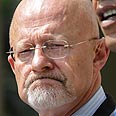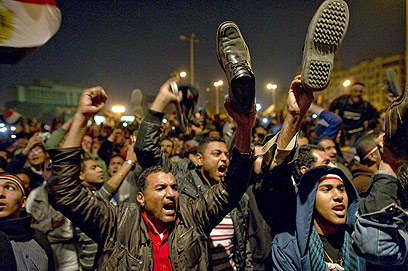
US spy chief: Muslim Brotherhood secular
Director of National Intelligence tells congressional hearing that Egypt's branch of Islamist organization has 'eschewed violence and decried al-Qaeda as a perversion of Islam.' They run 29 hospitals 'not under the guise of an extremist agenda,' Clapper says
Clapper, who heads the organization commanding 16 American intelligence and investigation agencies, told the committee that the Muslim Brotherhood "have pursued social ends, a betterment of the political order in Egypt, et cetera….. There is no overarching agenda, particularly in pursuit of violence, at least internationally.”

Angry protestors in Cairo (Photo: AFP)
He said that as opposed to Hezbollah, which also provides social services and medical care, the Brotherhood in Egypt runs 29 hospitals ”not under the guise of an extremist agenda.”
He said that the group fills a vacuum caused by the absence of government services, but added, “It is not necessarily with a view to promoting violence or overthrow of the state.”
This was not the only wrong assessment made by American intelligence officials. Leon Panetta, head of the Central Intelligence Agency, told the House Intelligence Committee on Thursday that he expected Egyptian President Hosni Mubarak to announce his resignation in a live broadcast, supporting reports from other sources to American correspondents in Cairo.
Several hours later, however, Mubarak said he would hand some of his authorities over to Vice President Omar Suleiman, but refused to step down.
Asked about reports that the Egyptian president was about to announce his resignation, Panetta clarified that "there's a strong likelihood that Mubarak may step down this evening, which would be significant in terms of where the, hopefully, orderly transition in Egypt takes place."
US President Barack Obama did not wait for Mubarak's speech as well, declaring that the world was watching history unfold and a moment of transformation in Egypt. After the speech, he avoided answering questions and held an emergency meeting of his national security team.
Obama later issued a written statement, openly and sharply questioned whether Mubarak's pledge to shift power to his vice president is an "immediate, meaningful or sufficient" sign of reform for a country in upheaval.
The Associated Press, Reuters and AFP contributed to this report
- Follow Ynetnews on Facebook










